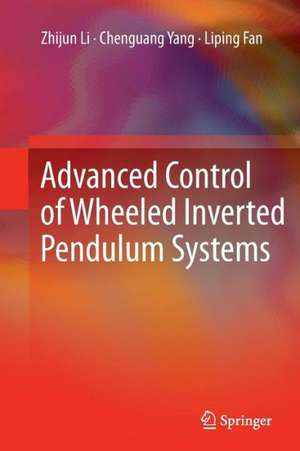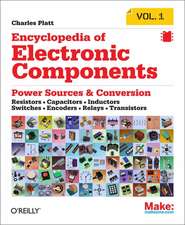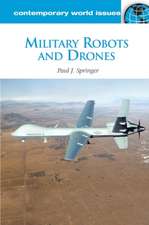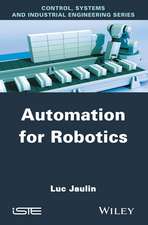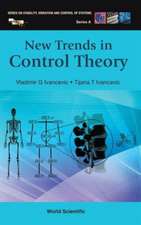Advanced Control of Wheeled Inverted Pendulum Systems
Autor Zhijun Li, Chenguang Yang, Liping Fanen Limba Engleză Paperback – 9 aug 2014
The book is self-contained, supplying the reader with everything from mathematical preliminaries and the basic Lagrange-Euler-based derivation of dynamics equations to various advanced motion control and force control approaches as well as trajectory generation method. Although primarily intended for researchers in robotic control, Advanced Control of Wheeled Inverted Pendulum Systems will also be useful reading for graduate students studying nonlinear systems more generally.
| Toate formatele și edițiile | Preț | Express |
|---|---|---|
| Paperback (1) | 778.13 lei 6-8 săpt. | |
| SPRINGER LONDON – 9 aug 2014 | 778.13 lei 6-8 săpt. | |
| Hardback (1) | 896.08 lei 6-8 săpt. | |
| SPRINGER LONDON – 13 iul 2012 | 896.08 lei 6-8 săpt. |
Preț: 778.13 lei
Preț vechi: 948.95 lei
-18% Nou
Puncte Express: 1167
Preț estimativ în valută:
148.91€ • 161.70$ • 125.09£
148.91€ • 161.70$ • 125.09£
Carte tipărită la comandă
Livrare economică 22 aprilie-06 mai
Preluare comenzi: 021 569.72.76
Specificații
ISBN-13: 9781447158806
ISBN-10: 1447158806
Pagini: 232
Ilustrații: XIV, 218 p.
Dimensiuni: 155 x 235 x 12 mm
Greutate: 0.33 kg
Ediția:2013
Editura: SPRINGER LONDON
Colecția Springer
Locul publicării:London, United Kingdom
ISBN-10: 1447158806
Pagini: 232
Ilustrații: XIV, 218 p.
Dimensiuni: 155 x 235 x 12 mm
Greutate: 0.33 kg
Ediția:2013
Editura: SPRINGER LONDON
Colecția Springer
Locul publicării:London, United Kingdom
Public țintă
ResearchCuprins
Mathematical Preliminaries.- Modeling of the MWIP System.- Path Planning and Motion Generation.- Linear Control Methods.- Nonlinear Control Methods.- Model-reference Adaptive Control.- Model-free Intelligent Control.- Learning Impedance Control.- Conclusions and Perspectives.
Notă biografică
Zhijun Li is an Associate Professor with the Department of Automation, Shanghai Jiaotong University. He received the Dr Eng Degree in mechatronics, Shanghai Jiao Tong University, PR China, in 2002. From 2003 to 2005, he was a postdoctoral fellow in the Department of Mechanical Engineering and Intelligent systems of The University of Electro-Communications, Tokyo, Japan. From 2005 to 2006, he was a research fellow in the Department of Electrical and Computer Engineering, National University of Singapore, and Nanyang Technological University, Singapore. Currently, he is an associate professor in the Department of Automation, Shanghai Jiao Tong University, PR China. Dr. Li is a senior member of the IEEE and his current research interests are adaptive/robust control, mobile manipulators, nonholonomic systems, etc.
Chenguang Yang obtained the Bachelor's degree in Measurement and Control Instrument and Technology at the Northwestern Polytechnical University in 2001 and the PhD degree in Control Theory at the National University of Singapore in 2010. From 2005 to 2009, he was working on adaptive/intelligent controllers for highly uncertain systems. In 2008, he worked for the TechX Challenge Urban Mobile Robot Competition organized by DSTA, Singapore, which is equivalent of the DARPA Grand Challenge in US. Together with teammates, he has developed a fully autonomous robot capable of climbing stairs, recognizing and operating an elevator, and navigating and searching for given targets in an unknown environment. From 2009 until 2010 he was with the Human Robotics Group in Imperial College London working on modeling of human neural-muscular control and development of robot control of human motor behavior. In connection with this he has developed a human-mimetic force- and impedance-adaptation algorithm for robots performing both stable and unstable tasks. Dr. Yang’s current research interests are in the fields of intelligent robotic control, nonlinearcontrol and human–robot interaction. He is the author of more than twenty-five peer-reviewed journal and conference papers. He received Honorable Mention in the Mathematical Contest in Modeling (the US competition supported by supported by NSF and NSA), 2004. Since 2006, he has been serving as reviewer of a number of top journals such as the IEEE Transactions on Automatic Control, Automatica and the IEEE Transactions on Neural Networks. He is a member of the Technical Program Committee of the 2011 Chinese Control and Decision Conference (2011 CCDC) and of the IEEE. Liping Fan received his B.S.in the Dept of Automation, Xiameng University in 1996, and from 2002, he is the founder of Shanghai Shengdisi Automation Equipment Co., LTD, and worked as CEO of the company until now, currently, he is the part-time graduate student of Dept of Auttomation, Shanghai Jiao Tong University. His research insterests are mechatronics system development, and control system design.
Chenguang Yang obtained the Bachelor's degree in Measurement and Control Instrument and Technology at the Northwestern Polytechnical University in 2001 and the PhD degree in Control Theory at the National University of Singapore in 2010. From 2005 to 2009, he was working on adaptive/intelligent controllers for highly uncertain systems. In 2008, he worked for the TechX Challenge Urban Mobile Robot Competition organized by DSTA, Singapore, which is equivalent of the DARPA Grand Challenge in US. Together with teammates, he has developed a fully autonomous robot capable of climbing stairs, recognizing and operating an elevator, and navigating and searching for given targets in an unknown environment. From 2009 until 2010 he was with the Human Robotics Group in Imperial College London working on modeling of human neural-muscular control and development of robot control of human motor behavior. In connection with this he has developed a human-mimetic force- and impedance-adaptation algorithm for robots performing both stable and unstable tasks. Dr. Yang’s current research interests are in the fields of intelligent robotic control, nonlinearcontrol and human–robot interaction. He is the author of more than twenty-five peer-reviewed journal and conference papers. He received Honorable Mention in the Mathematical Contest in Modeling (the US competition supported by supported by NSF and NSA), 2004. Since 2006, he has been serving as reviewer of a number of top journals such as the IEEE Transactions on Automatic Control, Automatica and the IEEE Transactions on Neural Networks. He is a member of the Technical Program Committee of the 2011 Chinese Control and Decision Conference (2011 CCDC) and of the IEEE. Liping Fan received his B.S.in the Dept of Automation, Xiameng University in 1996, and from 2002, he is the founder of Shanghai Shengdisi Automation Equipment Co., LTD, and worked as CEO of the company until now, currently, he is the part-time graduate student of Dept of Auttomation, Shanghai Jiao Tong University. His research insterests are mechatronics system development, and control system design.
Textul de pe ultima copertă
Advanced Control of Wheeled Inverted Pendulum Systems is an orderly presentation of recent ideas for overcoming the complications inherent in the control of wheeled inverted pendulum (WIP) systems, in the presence of uncertain dynamics, nonholonomic kinematic constraints as well as underactuated configurations. The text leads the reader in a theoretical exploration of problems in kinematics,dynamics modeling, advanced control design techniques,and trajectory generation for WIPs. An important concern is how to deal with various uncertainties associated with the nominal model, WIPs being characterized by unstable balance and unmodelled dynamics and being subject to time-varying external disturbances for which accurate models are hard to come by.
The book is self-contained, supplying the reader with everything from mathematical preliminaries and the basic Lagrange-Euler-based derivation of dynamics equations to various advanced motion control and force control approaches as well as trajectory generation method. Although primarily intended for researchers in robotic control, Advanced Control of Wheeled Inverted Pendulum Systems will also be useful reading for graduate students studying nonlinear systems more generally.
The book is self-contained, supplying the reader with everything from mathematical preliminaries and the basic Lagrange-Euler-based derivation of dynamics equations to various advanced motion control and force control approaches as well as trajectory generation method. Although primarily intended for researchers in robotic control, Advanced Control of Wheeled Inverted Pendulum Systems will also be useful reading for graduate students studying nonlinear systems more generally.
Caracteristici
Shows the reader current ideas on wheeled mobile robot control Gives the investigator a self-contained guide to the mobile version of a standard control test system Shows the reader how to actualize concepts of nonlinear control in a real system Includes supplementary material: sn.pub/extras
